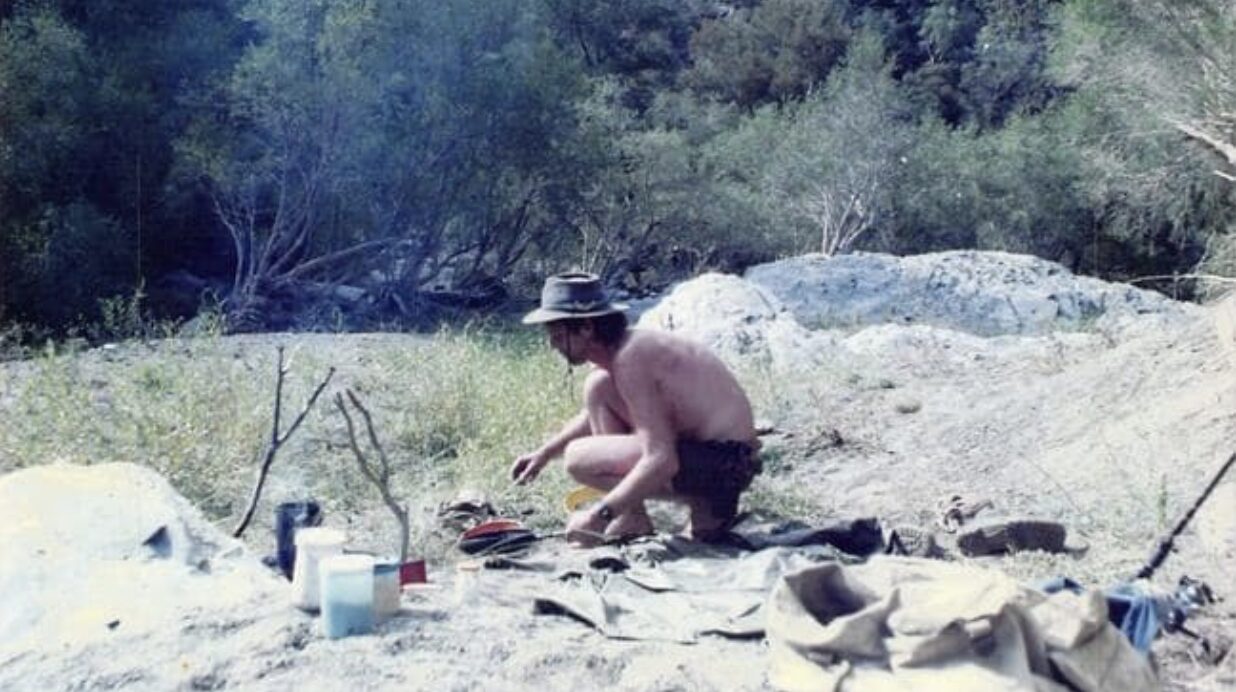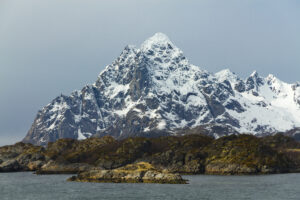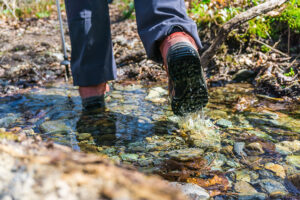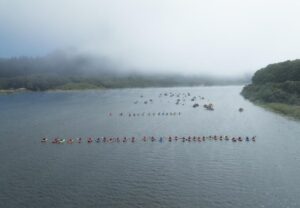Mark May was an intelligent young Australian with a scholarship to study law. Instead, he fled society and lived alone in a remote gorge for 35 years. He passed away in 2017, taking his own thoughts on his choice with him.
Since then, his family, the press and the world at large has been left trying to understand how, and why, the “hermit of Wild Rivers” rejected society.

Mark May spent most of his life alone in the bushlands and river gorges of Australia’s New South Wales. Photo: Wikimedia Commons
A promising start
Mark Francis May was born in 1954 on a 50-acre farm near Armidale, in New South Wales. He was the second-eldest of seven brothers whose father, Phil, put them to work from a young age. They spent their boyhoods learning to hunt and fish, clearing land and building the farmhouse.
Though a good student when he put his mind to it, Mark was somewhat of a loner, with a private, intellectual bent. When he was abused by a friend’s father, he told no one about it. As a child and young man, his brothers recall that Mark was very artistic and creative, fond of painting and playwriting, often forcing his siblings to stage his plays in elaborate, handmade costumes.
By his mid-teens, he’d decided to seriously dedicate himself to schoolwork. Mark excelled and won a scholarship to study law at the Australian National University. He made a go of it, but even in his first semester, he had a hard time with the university lifestyle. Mark struggled to do any of his schoolwork, instead falling into drug addiction.
“Bourgeois society,” he wrote to a friend at the time, sickened him. “I should live according to my human nature.”
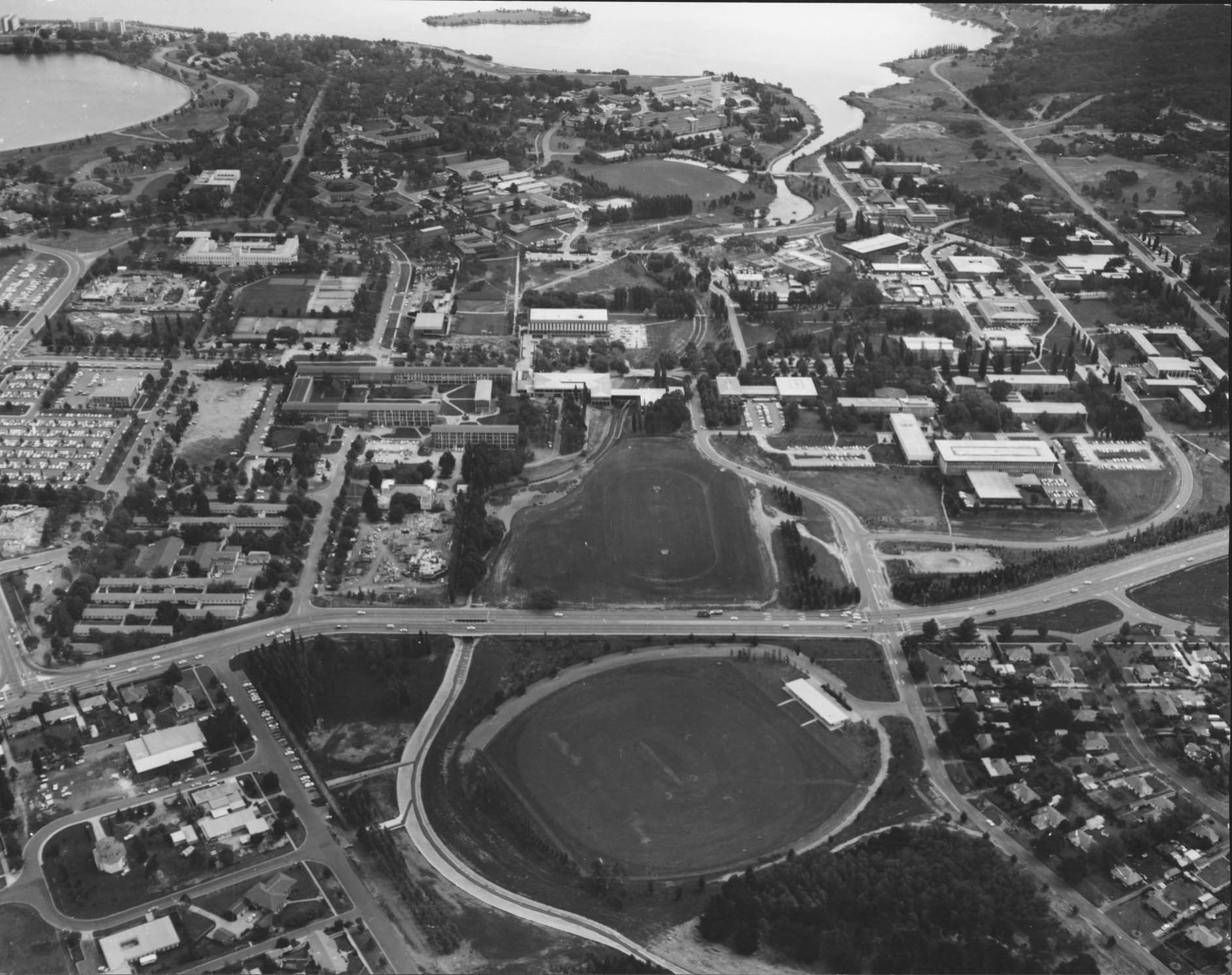
ANU in the 1970s when Mark May was attending. He spent more than half a decade trying to get his degree, but his personal challenges made it difficult. Photo: ANU archives
A troubled decade
But the next decade was a series of troubled behavior and run-ins with the law. On June 16, 1977, May appeared before Canberra Petty Sessions for trespassing. Contemporary newspaper reports allege that May and several other young men had refused to leave their boarding house. May was remanded on a $50 bail, but failed to appear in court and refused a good behavior bond.
Eventually, the incident came to a close, but by the next summer, he was in trouble again. In July 1978, he faced charges for cannabis possession and attempting to use an altered prescription to buy methadone. He pleaded guilty and was released with a $100 fine. The same year, he was arrested with methadone actually in his possession, as well as a stolen typewriter.
In late 1982, May pleaded not guilty to a charge of breaking into a pharmacy to steal drugs, 800 cigarettes and $12. May was found guilty, but the judge told reporters that due to time served and the fact that May was operating with diminished capacity due to being on a benzodiazepine at the time of the crime, he’d been sentenced leniently. May’s nine-month sentence was suspended in favor of a fine and a good-behavior bond.
During his two months in jail, Mark read Henry David Thoreau’s famous book, Walden. Not long after he was released, he went into the bush.

Thoreau retreated from the world to this cottage (replica shown) on the banks of Walden Pond. His book about the experience made a strong impression on May. Photo: Wikimedia Commons
Life in Wild Rivers
The rocky gorges of the falling tablelands were hard country, isolated. It got terribly cold in the winter and burning hot in the summer. Cattle and their keepers occasionally wandered through in the early years, before it became a national park. Once in a long while, a hiker, but that was all.
Mark May set up at the bottom of one of these gorges, making multiple camps which he moved between throughout the year. He hunted, fished and fixed up his camps, even constructing a staircase to get in and out of the gorge. Using mostly trash and found objects, Mark also built two more permanent structures, water collection systems, and gear storage.
Still a voracious reader, Mark brought his books down into the gorge. He had a radio and enjoyed listening to it, and befriended the local possum population, which soon, to his irritation, overran his camps.
He farmed, but not for food. Mark grew a small crop of marijuana in tiny, hidden enclosures. The money he made from this crop helped him pay for what he needed to survive. The local police later admitted they were aware of Mark’s drug activities, but he was so isolated, and his growing was so small-scale, that it wasn’t worth bothering about.
One of Mark’s camps with a tent as he’d left it. Photo: Dave May
Isolated but not completely disconnected
The nearest civilization was the small town of Hillgrove. It was a day’s hard trek from Mark’s home base, and a second day of walking to get from Hillgrove into Armidale. Mark made his way out once every few months, sometimes calling a friend from Hillgrove to get a lift. He attended holidays and family reunions sporadically and often without warning.
While he refused to get a postbox, he had dead-drop locations, like a hollow tree trunk, where he’d leave notes. Local farmers and friends would check on him, forming an informal support network which offered supplies or a few days rest out of the cold. But Mark always went back. The gorges were his home, and he felt unsafe anywhere else. The city, he said, made him sick.
His last visit was in Christmas of 2015. Mark was thin and quiet, with a persistent cough. He kept himself apart from the family at large but spoke extensively about his home, and his life, in the bush, urging his brother Pete to come visit.
By early July of 2017, no one had heard from Mark in months. Pete checked the hollow tree dead-drop near Hillgrove and found a worrying letter. Mark wrote that he was “OK, but starving,” and would be visiting for food the next Sunday. It was dated from late May.
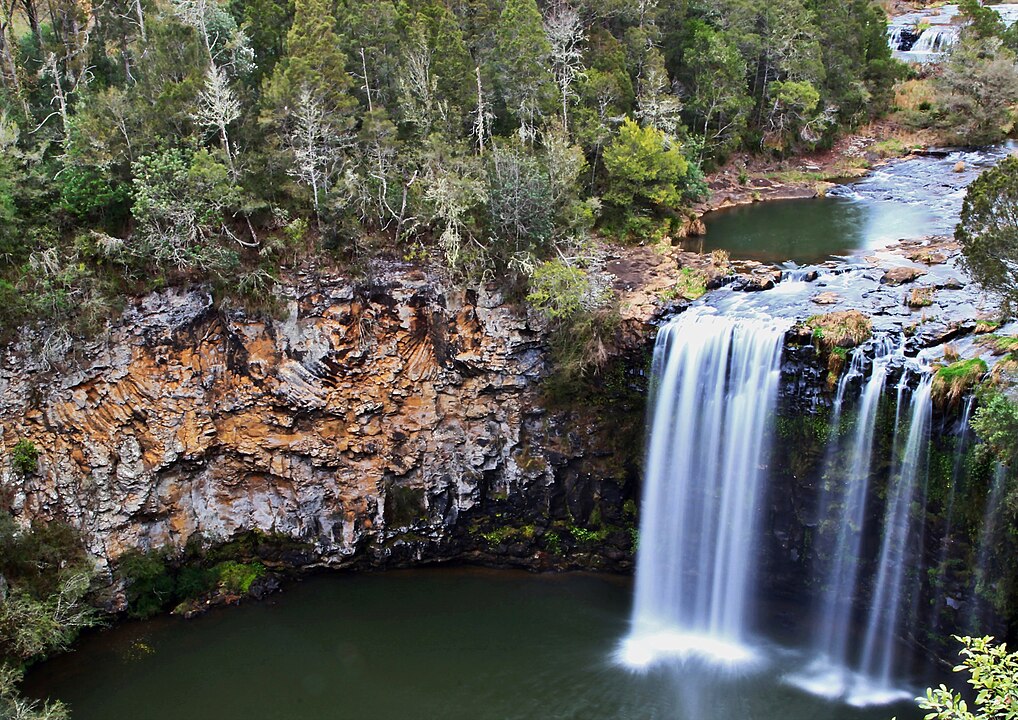
May’s camp was in a gorge near Armidale, in Oxley Wild Rivers National Park, a network of waterfalls and gorges. Photo: Wikimedia Commons
Searching for Mark May
Pete called his brother Steve, and they decided it was time to organize an expedition into the gorge. Weeks after his note, Mark had either starved, they calculated, or he had found food. It wasn’t a rescue mission.
The brothers, both country doctors and themselves experienced backwoodsmen, came prepared and well supplied. Along with Pete’s adult children Liz and Dave, they set out on the morning of July 15. A local farmer who’d looked in on Mark when he could helped point out the trail down the gorge, and the party descended.
Failing to find Mark’s hidden staircase, they were forced to scrambled down the gorge in the rain, trying not to think about how they’d ever get back out. Luckily, they made it down without incident and followed old cattle trails down to a large pool surrounded by rocky terraces. This was where Mark made his most permanent, main camp, and the state of it was reassuring.
They found everything neatly stored and packed away, as if he’d planned to leave it for some time. The family search party, knowing it was too late to turn back that evening, camped in Mark’s home with a sense of relief.
But the next morning, Pete walked down the river and found a backpack of Mark’s, caught in a shrub and laying open. The group decided to search for Mark’s other camps, so Liz and Steve waded across the river while Pete and Dave checked to the west.
It was Liz, reaching the eastern bank first, who found Mark’s body.

From Hillgrove, they hiked down the edge of the tablelands, making the dangerous descent into the network or gorges. Photo: Google Earth
Remembering the story of Mark May
Mark was lying in the entrance to his tent, his body decayed enough that later, when the coroner examined it, no cause of death could be determined. Unwilling to leave his body behind, the family buried him and hiked out of the gorge. Police later came and retrieved his remains, according to legal requirements. Eventually, however, Pete was allowed to bury one of Mark’s finger bones at his camp by the river.
After Mark’s story came to light, news reports were garbled and no one quite knew what to make of what had happened. Steve shared his recent loss with a childhood friend named Tom Patterson. Patterson had gone to school with several of the younger May brothers, and even lived with the family for several months. He had never met Mark, though, and the story deeply effected and fascinated him.
Hearing about Patterson’s interest, Pete handed over a box of typewritten and hand-scrawled documents which made up Mark’s unfinished memoir. Patterson launched himself into the material, supplementing it with interviews with the family.
In 2019, Pete took him down to the gorge where they visited Mark’s grave and toured his now abandoned home. His water collection system was so well made that years later, the water was still clean and fresh-tasting.
Patterson’s book about Mark May, Missing, was released in 2022.
